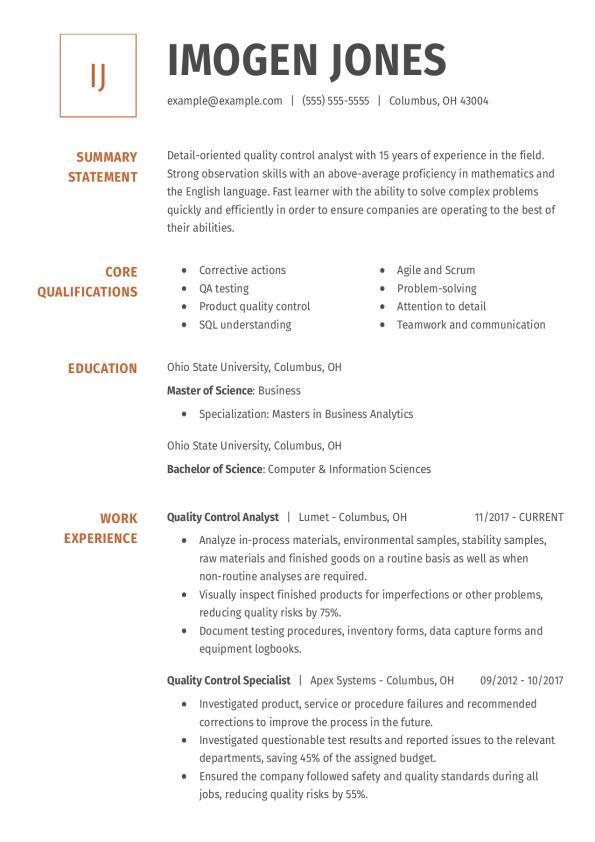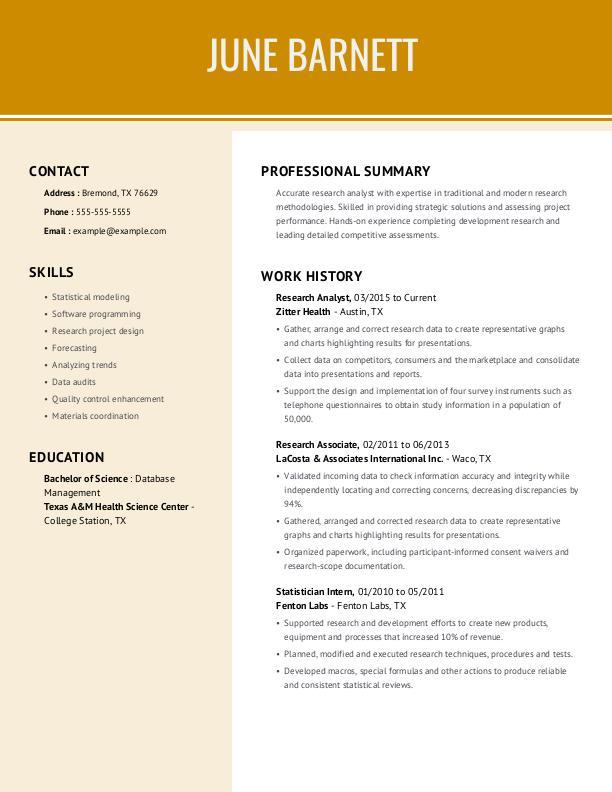Why this resume works
- Quantifies accomplishments: Measurable accomplishments, such as boosting system efficiency by 30%, highlight the applicant’s impact and value.
- Illustrates problem-solving ability: The applicant’s ability to improve client satisfaction scores by 25% illustrates problem-solving skills and innovative thinking.
- Highlights industry-specific skills: Highlighting industry-specific skills like system analysis and software integration shows the applicant’s readiness for IT roles.
More Systems Analyst Resume Examples
Take a look at our systems analyst resume examples to see the best ways to highlight your analytical, technical, and communication skills. These information technology resume examples will guide you in creating a resume that showcases your ability to optimize systems and improve processes.
Entry-Level Systems Analyst
Why this resume works
- Effective use of keywords: The applicant incorporates role-specific keywords like “systems analyst” and “cloud computing” into their experience, ensuring their resume aligns with employer expectations.
- Shows digital literacy: Mastery of tools such as cloud platforms and data analysis software highlights the applicant’s digital fluency, showcasing their computer skills for today’s tech-driven roles.
- Centers on academic background: Featuring advanced degrees in computer science and IT, the education section highlights the applicant’s academic excellence.
Mid-Level Systems Analyst
Why this resume works
- Points to measurable outcomes: By highlighting achievements such as boosting efficiency by 25% and saving $50k, the applicant showcases a knack for delivering impactful results through strategic IT optimizations.
- Demonstrates language abilities: Language skills in Spanish and French improve the applicant’s ability to engage in cross-cultural interactions, expanding their versatility.
- Clear contact information: A professional resume header with clear contact information ensures that potential employers can easily reach out for opportunities and interviews.
Experienced Systems Analyst
Why this resume works
- Lists relevant certifications: Listing certifications like Certified Systems Analyst and Project Management Professional highlights a dedication to advancing technical expertise and industry knowledge.
- Showcases impressive accomplishments: Achievements such as increasing sales by 40% through CRM implementation showcase measurable success, aligning with the impact-driven approach emphasized in accomplishments.
- Emphasizes leadership skills: Leading system integrations within six months reflects leadership skills and adaptability, and team coordination expertise.
Systems Analyst Resume Template (Text Version)
Ming Nguyen
Brookfield, WI 53018
(555)555-5555
Ming.Nguyen@example.com
Skills
- System Analysis
- Process Optimization
- Project Management
- Technical Documentation
- Software Integration
- Data Analytics
- Client Consultation
- Problem Solving
Languages
- Spanish – Beginner (A1)
- French – Intermediate (B1)
- Mandarin – Beginner (A1)
Professional Summary
Experienced Systems Analyst with expertise in systems optimization, project management, and client solutions, driving system efficiencies and process improvements.
Work History
Systems Analyst
Tech Innovators Inc. – Brookfield, WI
September 2022 – July 2025
- Boosted system efficiency by 30% using analytics.
- Led a team to integrate new software systems.
- Reduced project costs by 20% through optimization.
IT Business Consultant
Future Solutions Group – Milwaukee, WI
January 2019 – August 2022
- Enhanced client satisfaction scores by 25%.
- Streamlined processes saving 0K annually.
- Implemented IT solutions for 5 major clients.
Technical Analyst
Digital Dynamics Corp. – Milwaukee, WI
January 2017 – December 2018
- Upgraded systems leading to 40% downtime reduction.
- Assisted in the rollout of new applications.
- Developed technical documentation for end-users.
Certifications
- Certified Systems Analyst Professional – Institute for the Certification of Computing Professionals
- Project Management Professional (PMP) – Project Management Institute
- ITIL Foundation – AXELOS
Education
Master of Science Information Technology
Stanford University Stanford, California
June 2016
Bachelor of Science Computer Science
University of California, Berkeley Berkeley, California
June 2015
Related Resume Guides
Advice for Writing Your Systems Analyst Resume
Dive into our advice section on how to write a resume for a systems analyst role. Discover how to highlight your skills in system optimization, data analysis, and problem-solving to stand out in the tech world.

Highlight relevant technical skills
For a systems analyst role, technical skills are key to success. You can create a dedicated skills section on your resume to show these abilities clearly. This section helps employers quickly see your strengths in areas like data analysis, software development, and troubleshooting. By listing specific skills, you make it easy for hiring managers to understand your capabilities.
Another way to highlight your technical skills is by integrating them into the work experience section. When describing past jobs, mention how you used certain tools or technologies to achieve results. For example, if you improved system efficiency using SQL or Python, include that detail in your job descriptions.
Commonly sought-after technical skills for systems analysts include database management, programming languages like Java or C++, and knowledge of operating systems such as Linux or Windows. Understanding network protocols and cybersecurity basics can also be beneficial.
Tailor these lists based on the specific requirements of the job you’re applying for to make sure your resume stands out from others.
Example of a technical skills section
- Systems analysis and design
- Database management (SQL, Oracle, MySQL)
- Business process modeling (BPMN, UML)
- Project management tools (JIRA, Trello)
- Data visualization (Tableau, Power BI)
- ERP systems (SAP, Microsoft Dynamics)
- Network security protocols
- Cloud computing platforms (AWS, Azure)
- Programming languages (Java, Python, C#)
You can use our Resume Builder to easily craft a resume that highlights technical skills and essential soft skills like communication, adaptability, and leadership.
Quantify your accomplishments
Quantifying accomplishments in your resume makes it more compelling because it shows actual impact rather than just listing tasks. For a systems analyst, it’s important to highlight how your work improved processes or saved resources. In the work experience section, each entry should have your job title, employer name, location, and employment dates.
Instead of just saying you managed systems, describe what happened because of your management. Did you reduce downtime by 30%? Did you save the company $10,000 through better system efficiency? These numbers show tangible success and impact. Using action verbs along with metrics creates a strong, results-driven resume.
When you say “increased system accuracy by 15%” or “cut report generation time from 3 days to 1 day,” you’re presenting achievements rather than general duties. This approach helps hiring managers quickly see your skills and contributions.
By turning duties into measurable achievements, you make it easy for employers to gauge your potential value to their team. Quantified accomplishments paint a clear picture of your abilities and past successes that stand out in the job market.
5 systems analyst work history bullet points
- Analyzed system requirements and collaborated with 10+ cross-functional teams to implement software solutions, boosting operational efficiency by 25%.
- Led the integration of new IT systems across 3 departments, resulting in a 30% reduction in processing time.
- Conducted risk assessments and developed contingency plans that decreased security incidents by 40%.
- Streamlined data management processes through automation, improving data accuracy by 20% and reducing manual workload.
- Facilitated user training sessions for new system implementations, improving user adoption rates by 50%.
Need help making your resume pop? Check out professional resume examples to see what successful resumes look like and get ideas for your own.
Write a powerful professional summary
A professional summary on a resume serves as an introduction for hiring managers, providing a snapshot of your skills and accomplishments. You can decide whether to use a summary or a resume objective based on your experience level and career goals.
A professional summary is made up of three to four sentences highlighting your experience, skills, and achievements. It’s perfect for experienced applicants who want to showcase their professional identity and value in their field. By using action-oriented language, you highlight what you’ve accomplished as a systems analyst and how you’ve impacted previous roles.
In contrast, resume objectives focus on career goals and are ideal for entry-level candidates, career changers, or those with employment gaps. While summaries answer “what I’ve accomplished,” objectives address “what I aim to contribute.”
Next, we’ll provide examples of both summaries and objectives suited for different industries and experience levels so you can create the perfect introduction for your resume.
Systems analyst resume summary examples
Entry-level
Recent computer science graduate with a focus on systems analysis and design. Completed internships involving data modeling, process mapping, and requirements gathering. Certified in CompTIA A+ and familiar with SQL databases and system development life cycle (SDLC). Enthusiastic about leveraging analytical skills to support IT teams in optimizing business processes.
Mid-career
Systems analyst with over seven years of experience in the finance industry, adept at analyzing complex data systems and implementing effective solutions. Proven track record in managing cross-functional projects, improving system performance, and reducing downtime by 30%. Experienced with Agile methodologies and holding a certification in ITIL Foundation. Known for strong problem-solving abilities and a collaborative approach.
Experienced
Senior systems analyst with over 15 years of expertise in enterprise resource planning (ERP) systems across multiple sectors, including healthcare and manufacturing. Skilled in leading teams through large-scale system migrations and upgrades that have resulted in significant cost savings. Holds certifications in PMP and Six Sigma Green Belt, focusing on process improvement initiatives that drive operational efficiency.
Systems analyst resume objective examples
Recent graduate
Detail-oriented and analytical recent computer information systems graduate seeking an entry-level systems analyst role to apply academic experience in data analysis and system optimization. Eager to contribute innovative solutions to improve efficiency and effectiveness within a technology-driven organization.
Career changer
Resourceful professional transitioning from customer service into systems analysis, bringing strong problem-solving skills and a keen understanding of business operations. Looking to leverage these abilities in identifying system improvements that improve user experience and operational processes.
Specialized training
Certified systems analyst with training in cybersecurity principles, eager to join a forward-thinking tech company. Passionate about using specialized knowledge to safeguard data integrity while supporting system enhancements that align with organizational goals.
Opt for a resume template with clear sections and easy-to-read fonts, steering clear of busy graphics or excessive colors to help employers quickly spot your skills and experience.
Showcase your credentials
Listing certifications and specialized training is important for a systems analyst because it shows you have the skills needed in tech fields. These credentials prove you can handle complex systems, making you stand out to employers.
Creating a dedicated certifications section on your resume helps hiring managers quickly see your qualifications without digging through other details. Here are a few examples of certifications to include on your resume:
- Certified Business Analysis Professional (CBAP)
- PMI Professional in Business Analysis (PMI-PBA)
- IIBA Certification of Competency in Business Analysis (CCBA)
- Microsoft Certified: Power Platform Functional Consultant Associate
- AWS Certified Solutions Architect – Associate
- CompTIA Security+
- Certified ScrumMaster (CSM)
- ITIL Foundation Certification
Having these certifications can greatly improve your chances of getting hired as a systems analyst. They show you’re up-to-date with the latest technologies and ready to solve different challenges. Including them prominently on your resume helps you succeed in this tech-savvy role.
Example of a certifications section
Certified Information Systems Analyst (CISA)
Issued by: ISACA
Issued 2022
Microsoft Certified: Azure Solutions Architect Expert
Issued by: Microsoft
Expires 2025
CompTIA Security+
Issued by: CompTIA
Issued 2021
Project Management Professional (PMP)
Issued by: Project Management Institute (PMI)
Expires 2024
ITIL Foundation Certification
Issued by: AXELOS Global Best Practice
Issued 2023
Use a polished and professional resume format that aligns with your experience level to ensure your skills and qualifications stand out to hiring managers.
Salary Insights for Systems Analysts
Exploring salary data can provide valuable insights into industry trends and typical pay ranges. This information helps you make informed decisions about your career and negotiate with confidence.
Top 10 highest-paying states for systems analysts
Systems Analysts earn varying salaries across the United States, with a national average of $102,756. The table below highlights the states where systems analysts command the highest compensation.
Our salary information comes from the U.S. Bureau of Labor Statistics’ Occupational Employment and Wage Statistics survey. This official government data provides the most comprehensive and reliable salary information for systems analysts across all 50 states and the District of Columbia. The figures presented here reflect the May 2025 dataset, which is the most recent available as of this publication.
| State | Average Salary |
|---|---|
| Washington | $133,710 |
| California | $132,940 |
| Massachusetts | $126,190 |
| New Jersey | $124,650 |
| District of Columbia | $123,720 |
| Rhode Island | $120,290 |
| Oregon | $120,860 |
| Virginia | $120,880 |
| New York | $115,250 |
| Maryland | $115,010 |
FAQ
Do I need to include a cover letter with my systems analyst resume?
Yes, adding a cover letter to your systems analyst resume is a smart move. It allows you to highlight your enthusiasm for the role and company while showcasing specific projects or skills that match their needs.
For example, if the company uses certain software or methodologies you’re familiar with, you can emphasize this expertise and how it has helped previous employers.
You might also find it helpful to use tools like our Cover Letter Generator, which guides you through crafting an effective letter by offering step-by-step advice and content suggestions.
Additionally, checking out cover letter examples tailored to tech roles can provide inspiration and insight into what makes a strong application.
How long should a systems analyst’s resume be?
For a systems analyst, aim for a one-page resume to effectively highlight your technical skills and relevant experience.
If you have extensive experience or advanced certifications, extending to a two-page resume is acceptable. Focus on showcasing your skills with essential tools, problem-solving abilities, and successful project implementations.
Tailor each section to underline how you’ve contributed to system improvements and efficiencies in past roles. Emphasize recent experiences that align closely with the job you’re targeting. This keeps your resume engaging and directly relevant.
To refine your resume further, explore our guide on how long a resume should be for more examples and tailored tips based on your career stage.
How do you write a systems analyst resume with no experience?
Starting as a systems analyst with no direct experience? Highlight your education, transferable skills, and relevant projects to make your resume with no experience shine. Here are a few tips:
- Highlight educational background: Start by listing your degree in computer science or a related field. Include coursework that aligns with systems analysis, like data management or information systems.
- Leverage academic projects: Describe any school projects where you analyzed data, designed systems, or worked with databases. Detail the tools and methodologies you used, as this demonstrates practical knowledge.
- Showcase technical skills: List software and programming languages you’re proficient in, such as SQL, Python, or Excel. These are important for a systems analyst role and show readiness to tackle real-world challenges.
- Include internships or volunteer work: If you’ve interned or volunteered in roles involving IT support or system maintenance, detail these experiences to showcase hands-on exposure to tech environments.
Remember to tailor your resume to highlight how your unique mix of education and skills can contribute effectively in a systems analyst position.
Rate this article
Systems Analyst
Additional Resources

Computer Systems Consultant Resume Guide + Tips + Example
A well-written Resume is a great place to start if you seek a computer systems consultant position. Not sure where to begin? Don’t worry! Our guide to crafting an excellent

Quality Control Analyst Resume Guide + Tips + Example
Propel your career with a well-written quality analyst Resume. With our guide, you can create a professional quality analyst Resume to showcase your skills and present you as a desirable

Data Analyst Cover Letter Examples & Templates
Data analysts are essential positions in most job industries. They collect, process, and analyze data to help companies make informed business decisions. A well-written cover letter for a data analyst

Data Analyst Resume Examples & Templates
Data analysts are experts in processing and presenting data in ways that help organizations and companies. Beyond your excellent database knowledge and data visualization expertise, your data analyst resume must

Research analyst Resume Guide + Tips + Example
Advance your research analyst career with a strong resume. We have the perfect guide to help you, with tips on what to add, skills to include, and how using a

Operations Analyst Resume Guide + Tips + Example
Get the analyst job you want with a professional operations analyst resume. With our guidance, you can create an effective operations analyst resume to showcase your relationship-building skills, statistical analysis
